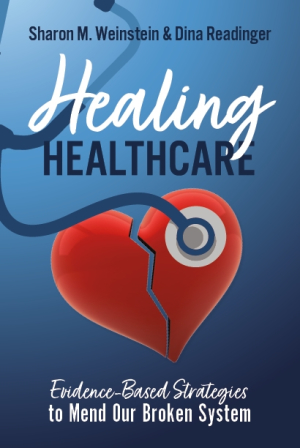Healing Healthcare
Evidence-Based Strategies to Mend Our Broken System
Flush with insider knowledge, Sharon M. Weinstein and Dina Readinger’s revealing health-care study Healing Healthcare uses underserved nurses as examples of contemporary crises in medicine.
Positioning nurses as the embattled figures at the center of contemporary health-care systems, Sharon M. Weinstein and Dina Readinger’s industry survey Healing Healthcare suggests innovative solutions to ongoing issues in medicine.
While acknowledging that COVID-19 stretched international medical systems to their breaking points, this book argues that chronic shortages in staffing and abysmal mental health outcomes among frontline workers far predated 2020. It says that these issues hit nurses in a particular manner, leading to their being overworked and impacting retention and attrition numbers. Mutual support communities become difficult to sustain under such circumstances, it asserts, with health-care workers’ groups fragmented by burnout and resentment toward contract workers who are brought in to fill the gaps. The book supports its claims with statistics, as of the suicide rate among nurses, which is 18 percent higher than that of the general population.
The book also introduces a method for developing social bonds and emotional awareness while fostering critical thinking in health-care organizations. It is methodical in its problem-solving approach, addressing issues in the workforce, those related to nurses’ well-being, and sharing general wisdom in turn across nine chapters each, avoiding overwhelm by addressing specific problems in clear ways while proposing actionable solutions. Failures to create positive hospital work environments are attributed to higher education programs, for example, which are said to produce nurses without promoting values like health, well-being, and communication. Hospital hierarchies are also critiqued for their tendency to silence nurses or weaponize tight budgets against them.
Twenty-six nurses and health-care professionals contributed to this project. They reference their own experiences to illuminate various aspects of the medical crisis. They include nuanced information on topics as diverse as the financials of successful hospitals and the mental health, lifestyles, and aspirations of first-year nurses. Their sometimes axiomatic advice ranges from advocating for basic labor union practices to the ephemeral need for joy in the workplace. But while individual chapters within the book contain practical ideas from frontline workers, advice for implementing their ideas is not systematic enough. The postscript works to distill the collected advice into actionable steps, but it arrives too late to be fully effective.
The industry manifesto Healing Healthcare foregrounds the analyses of nurses and other professionals to advocate for new approaches to health-care problem-solving.
Reviewed by
Willem Marx
Disclosure: This article is not an endorsement, but a review. The publisher of this book provided free copies of the book and paid a small fee to have their book reviewed by a professional reviewer. Foreword Reviews and Clarion Reviews make no guarantee that the publisher will receive a positive review. Foreword Magazine, Inc. is disclosing this in accordance with the Federal Trade Commission’s 16 CFR, Part 255.

